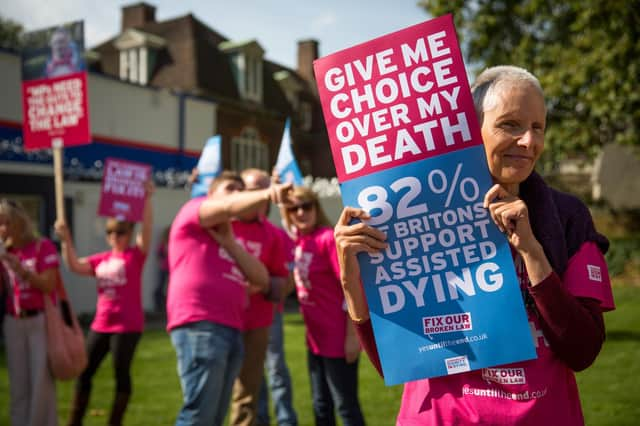Explained: How would Scotland’s assisted dying laws work and what are the safeguards?


Liam McArthur has lodged his plans to legalise assisted dying for terminally ill people at Holyrood – the third attempt to legislate for the principle in Scotland.
The LibDems MSP’s Bill would allow mentally competent adults with an advanced, progressive terminal illness to be provided with assistance to end their life at their request.
Advertisement
Hide AdAdvertisement
Hide AdWhat are the plans to legalise assisted dying?
The proposals published by Mr McArthur set out the criteria for who would be able to receive lawful assistance to end their life and the process to do it.
Those eligible must be aged 16 or older in line with the age of legal capacity in Scotland, have suitable capacity to request an assisted death and not been coerced into it and must have been resident in Scotland for at least 12 months and registered with a Scottish medical practice.
This Bill specifically does not allow assisted dying for persons with any illness, condition, or disability, either physical or mental, other than terminal illness.
How would someone request an assisted death?
Under the plans, if someone makes a request for an assisted death, two independent medical practitioners would assess them to make sure their clinical condition and mental competence meet the criteria and to make sure they have not been pressures into their decision.
If the independent doctors both determine that the person is eligible for an assisted death, the person must then make a second declaration requesting assistance to end their life.
The Bill mandates a minimum 14-day period of reflection between the first and second requests, though this period can be shortened to no less than 48 hours if the medical practitioners believe this is necessary because death is imminent. As part of both the first and second requests, the person making the request would sign a written declaration stating that they are requesting an assisted death, which would then be co-signed by the medical practitioners and appropriate witnesses.
Once all the conditions are satisfied, the medical practitioner, or another authorised health professional, may provide the terminally ill adult with the approved substance with which the adult may end their own life.
The authorised health professional must conduct a final capacity check before delivering the substance and must then remain with the person until the person decides whether to use the substance and, if they decide to do so, until the person has died.
Advertisement
Hide AdAdvertisement
Hide AdWhat are the other safeguards?
Under the plans, any person seeking an assisted death may decide at any time not to continue with the process and any cancellation will be documented and recorded. The Bill specifies all the documentation that will be required throughout the process, including the medical practitioner’s final statement, and the person’s death certificate.
Mr McArthur’s Bill excludes criminal and civil liability for providing an assisted death according to the process it sets out, as well as making it a criminal offence to coerce someone into an assisted death. The legislation also sets out limitations on the effect of the Act in relation to reserved matters held by the UK Government.
The Bill enables Scottish Government ministers to prepare and publish guidance on the lawful provision of assisted death for terminally ill adults, and to establish regulations setting out levels of qualification and experience required for healthcare practitioners to participate in the assisted dying process.
What are the concerns?
Critics have warned that legalising assisted death “introduces a dangerous idea that a citizen can lose their value and worth”.
Opponents have also warned that the legislation would send “a message that there are situations when suicide is an appropriate response to one’s individual circumstances, worries, anxieties” and “normalises suicide and accepts that some people are beyond hope”.
Those opposing the legislation have also claimed that the Mr McArthur’s Bill could undermine trust in doctors and could damage the doctor-patient relationship.
Critics have claimed that in countries where assisted death is legal, there is evidence that vulnerable people, including the elderly and disabled, experience external pressure to end their lives.
Haven’t we been here before?
This is the third attempt to legislate for assisted dying or suicide in Scotland. Two previous attempts in 2010 and 2015 failed to gain enough support from MSPs to clear the first stage of its legislative journey at Holyrood.
Advertisement
Hide AdAdvertisement
Hide AdIn 2004, LibDems MSP Jeremy Purvis MSP lodged a proposal for a Bill to allow capable adults with a terminal illness to access the means to die with dignity but his plan failed to get the required number of supporting MSPs to be introduced.
In 2010, independent MSP Margo MacDonald introduced the End of Life Assistance (Scotland) Bill to enable persons whose life has become intolerable and who meet the conditions prescribed in the Bill to legally access assistance to end their life. Although it was introduced, the Bill failed to clear stage one of the legislative journey.
Three years later, Ms MacDonald introduced the Assisted Suicide (Scotland) Bill for certain people who are approaching the end of their lives to seek assistance to end their lives at a time of their own choosing. Ms MacDonald lived with Parkinson’s disease and died in 2014 with Green MSP Patrick Harvie taking over as the Bill’s sponsor. Once again, the Bill failed to get enough support to make it past stage one at Holyrood.
Comments
Want to join the conversation? Please or to comment on this article.